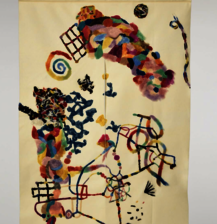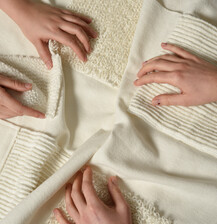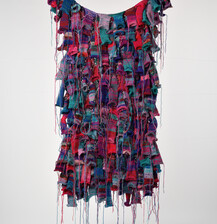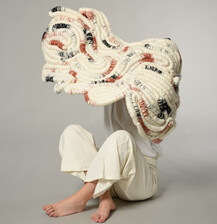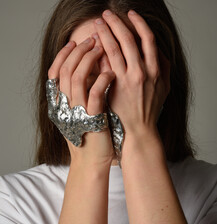Wintersemester 2023/2024, BA/MA Textil- und Material-Design
Staying in Touch
STAYING IN TOUCH – How do we feel in a dematerialized World?
Berührung ist unser erster Kontakt zur Welt. Sie ist von entscheidender Bedeutung für unsere emotionale und neurobiologische Entwicklung. Sie beeinflusst unser körperliches und seelisches Wohlbefinden und kann im negativen Sinne, im Fall einer Grenzüberschreitung, Schmerz und Verletzung auslösen.
Doch wie fühlen und berühren wir in der dematerialisierten digitalen Kultur? Welche Bedeutung hat diese Entwicklung für unseren Körper, unser Empfinden und unseren Instinkt? Welchen Einfluss haben Social Distancing oder soziale Medien, die eine scheinbare Nähe zu anderen suggerieren? Welche Auswirkungen haben digitale Objekte auf unseren Tastsinn? Welchen Einfluss haben Algorithmen auf unsere instinktiven Entscheidungen und unser Bauchgefühl?
In dem Kurs "Staying in Touch" untersuchen wir die Prozesse der Berührung und des Fühlens, Gesten des Greifens und des Machens.
"(…) das lässt erkennen, wie sehr der Prozess unseres Denkens von unseren Händen durch die Geste des Machens und durch den Druck geformt ist, den die Hände auf die Gegenstände ausüben (…)" — Vilém Flusser
Unter Berücksichtigung von Methoden des Handgemachten erforschen wir in diesem Zusammenhang die haptische, taktile und sinnliche Qualität von Textilien, ihre Bedeutung und ihr Potenzial, positiven Einfluss auf diese gesellschaftliche Entwicklung zu nehmen.
Wie können Textilien dazu beitragen, dass wir mit unseren Körpern, Gefühlen und unserer sozialen und materiellen Umwelt auf positive Weise "in touch" bleiben? Berührungen können Gefühle besser kommunizieren. Können Textilien – ein Material, mit dem wir kontinuierlich in Berührung sind – positive Gefühle vermitteln oder auslösen?
In Auseinandersetzung mit der oben genannten Thematik entwickeln die Studierenden haptisch interessante Textilien und Materialien, die unsere Gefühle und unseren Tastsinn stimulieren und in frei wählbarer Form Anwendung finden.
———
STAYING IN TOUCH - How do we feel in a dematerialized World?
Touch is our first contact with the world. It is of essential importance for our emotional and neurobiological development. It influences our physical and emotional well-being and, in a negative sense, can trigger pain and injury in the event of a boundary transgression.
But how do we feel and touch in the dematerialised digital culture? What significance does this development have for our bodies, our sensibilities and our instincts? What is the influence of social distancing or social media that suggest an apparent closeness to others? What impact do digital objects have on our sense of touch? What influence do algorithms have on our instinctive decisions and gut feeling?
In the course "Staying in Touch" we explore the processes of touching and feeling, gestures of reaching and making.
"(...) this suggests how much the process of our thinking is shaped by our hands through the gesture of making and by the pressure that hands exert on objects (...)" - Vilém Flusser.
Taking into account handmade methods, we explore in this context the haptic, tactile and sensual quality of textiles, their meaning and their potential to have a positive influence on this social development.
How can textiles help us to stay "in touch" with our bodies, feelings and our social and material environment in a positive way? Touch can communicate feelings better. Can textiles - a material we are continuously in touch with - communicate or trigger positive feelings? In addressing the above topic, the students develop haptically interesting textiles and materials that stimulate our feelings and sense of touch and are applied in a freely selectable form.
Project categorySemester Project Project subjects BA/MA Textil- und Material-Design
